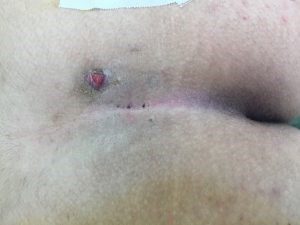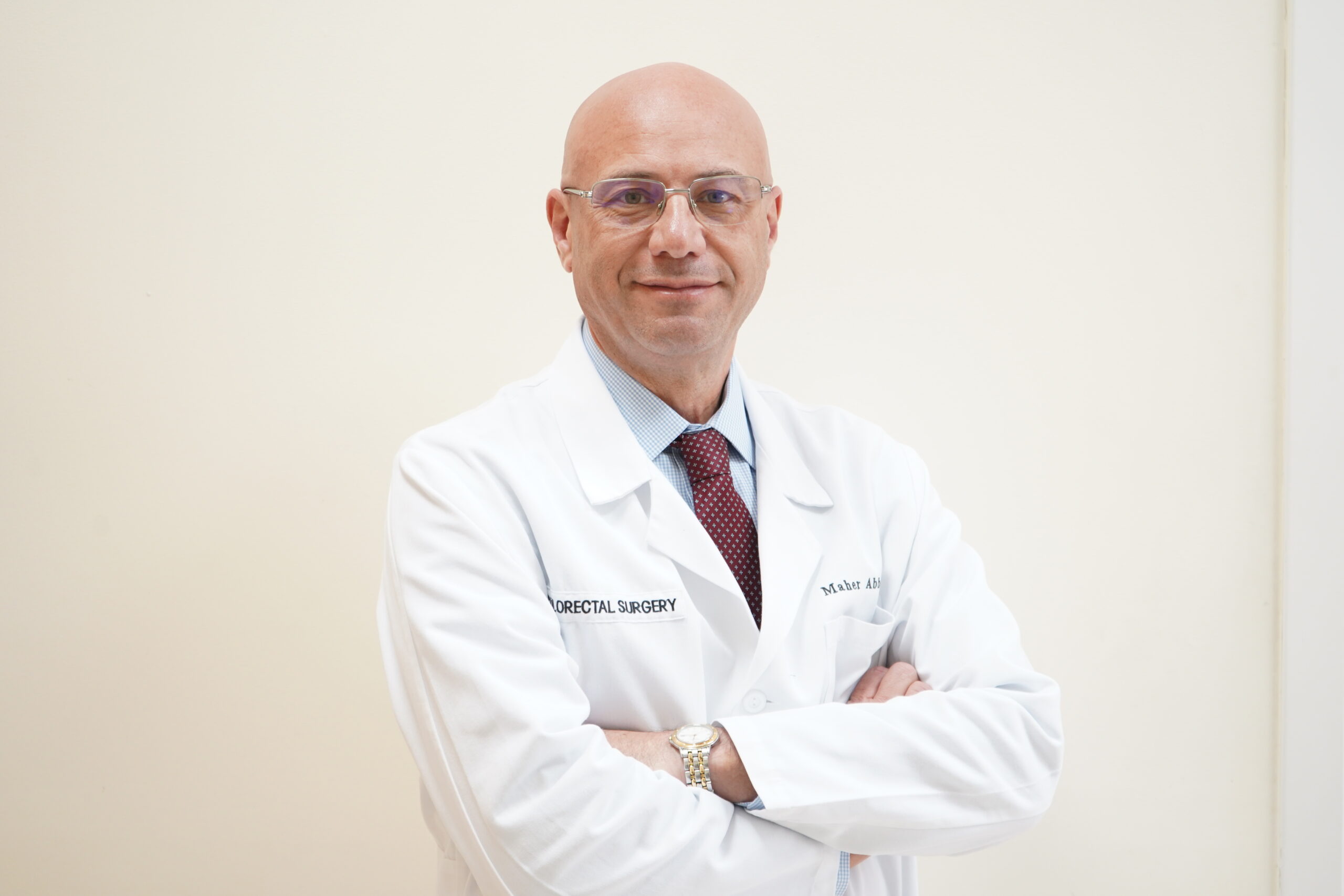What is pilonidal disease?
Pilonidal disease is a skin condition commonly referred to as a hair cyst. Patients can present with a variety of symptoms including pain, swelling, redness, drainage of pus and/or blood from a skin opening in the upper aspect of the buttocks [Figure 1]. Symptoms can be present from days to years. Occasionally patients can present with a painful abscess that requires immediate incision and drainage. The condition predominantly affects young people from teenage years into adulthood. The cyst typically occurs between the cheeks of the buttocks around the tailbone. The main risk factor is excessive hair. Often small skin openings called pits lead to a deeper skin sinus and cyst [Figure 2].

Figure 1- Pilonidal cyst

Figure 2 – Three small sinus openings in the middle with a cyst noted on the left
What are the treatment options for pilonidal disease?
Most patients with symptomatic hair cyst do benefit from surgical intervention. Dr. Maher Abbas personalizes the care of his patients with pilonidal disease based on a variety of factors. It is important to note that wound healing in the area can take time and can be challenging to manage especially in patients who are obese, have deep buttocks cleft, and/or are smokers. Postoperative wound care is as important as the surgical intervention itself. Dr. Maher Abbas employs simple and minimally invasive techniques for most of his patients. Several treatment options are currently available:
- Incision and drainage of an infected cyst abscess
- Excision (removal of the cyst) and flap closure of the wound
Minimally invasive techniques:
- Unroofing and marsupialization
- Laser obliteration and pit removal
- Video assisted ablation of pilonidal sinus (VAAPS)
Unroofing and marsupialization involves dividing the sinus tract without removal of any tissue in order to minimize the wound size. Wound care is done daily until closure.
Laser obliteration entails enlarging the pit opening, cleaning the sinus tract and cyst, removing any trapped hair, and using laser energy [Figure 3] to obliterate the tract with a laser probe [Figure 4].

Figure 3 – Laser machine

Figure 4 – Laser probe for pilonidal sinus and cyst treatment
Video assisted ablation of pilonidal sinus (VAAPS, also known by EPSiT and EPAT acronyms) is another minimally invasive technique used to treat pilonidal disease. It is similar in concept to the laser procedure. A rigid endoscope is inserted through the skin opening of the sinus. A heating energy is used to coagulate and scar the sinus tract [Figure 5].

Figure 5 – Video assisted ablation of pilonidal sinus
A major risk factor for non-healing or recurrence of pilonidal disease is hair infiltration of the wound. It is imperative that the patient is very diligent with hair removal from the wound and surrounding skin. Even after closure of the skin, the wound scar is soft and hair can poke through the skin and cause the disease to come back. Dr. Maher Abbas recommends hair removal during the recovery period and for at least 6 months after surgery until the scar of the wound is mature and complete (Pilonidal Wound Care).
Is every patient a candidate for a minimally invasive procedure for pilonidal disease?
A minimally invasive procedure for pilonidal disease is appropriate in some patients. Dr. Maher Abbas needs to assess each case taking into consideration the patient’s related factors and disease features in order to determine the most effective treatment for an individual patient.
Why seek expert care with a board certified proctologist and colorectal surgeon?
Pilonidal disease can be challenging to treat with a risk for non-healing and recurrence. The expertise of the doctor is critical in order to ensure the best results and minimize the risk of recurrence, non-healing, and infection.

Dr. Maher Abbas is an expert in the treatment of diseases of the colon, rectum, and anus. With over a 30-year career in the USA, he has completed advanced training in Proctology and is American Board Certified in Colon and Rectal Surgery. Dr. Maher Abbas is a Fellow of the American Society of Colon and Rectal Surgeons.
If you would like to schedule a consultation with Dr. Maher Abbas to discuss your case, click here.







